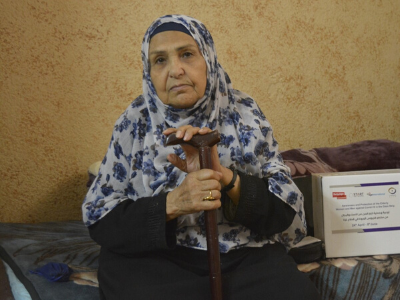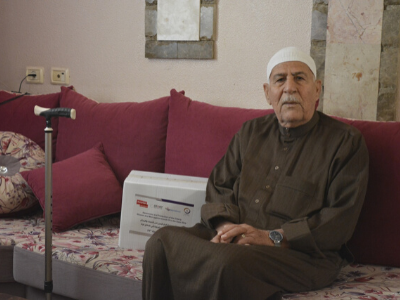Surviving the coronavirus lockdown in Gaza: Two stories
Umm Imad and Assad Maddukh are both older refugees living with their families in the Gaza strip in very poor conditions. They’re worried about the impact of COVID-19 on the area and the prevention measures are already having a dramatic impact on their lives.

Umm Imad's story
Umm Imad lives with her daughter-in-law and grandson. Her eldest son and main source of income disappeared a long time ago, leaving his wife and only son behind. Before coronavirus, to make a living Umm Imad would wake up early, tend to her house and her grandson, then go to the market to buy some worn clothes at a cheap price. At home, she would wash and sterilize the clothes and prepare to sell them on in the market in a better condition. But after the declaration of the state of emergency and the closure of markets, she is without an income and does not have any money to provide for her urgent needs and those of her daughter-in-law and her grandson.
Umm Imad suffers from several chronic diseases, such as high blood pressure and diabetes, and the only assistance she receives is some free medical treatment given to her by The United Nations Relief and Works Agency for Palestine Refugees (UNRWA). She needs medical supplies, and in order to afford them always put aside part of her humble income. But now she is having to go without. For now, she is getting by on the small amount of money she had saved.
“I was poor before Coronavirus began, but now it’s even worse. If the lockdown lasts much longer, we will be reduced to begging.”
COVID-19 has had a severe and direct impact on Umm Imad and her family, affecting them psychologically and impacting their lives and daily work. On top of this, they have also been experiencing power cuts during very high summer temperatures.
She always listens to the news about coronavirus on the TV and media and is worried by what she hears, as she knows older people are the most affected by the virus. She is comforted by having a little knowledge of how to prevent COVID-19, by not touching her eyes or face, and regularly washing her hands, but she is not able to stay home all the time which leaves her very stressed and worried. The emergency and the fear and stress it has caused have changed her whole demeanour. But Umm Imad’s needs are simple: water, sanitation and hygiene products, and medicine.

Assad's story
85-year-old Assad Maddukh lives in the Gaza Strip with his 11 children. The COVID-19 measures have put a stop to their sole source of income. One of Assad’s sons supports the family by running a small shop selling coffee and tea, but it had to close because of the COVID-19 emergency. Assad does not receive any other support, other than the medical treatment he receives from UNRWA.
Assad is worried about the virus because he is an older person and he knows an outbreak would spread quickly in the Gaza strip, which is a small and crowded area. He has several age-related and chronic diseases, such as high blood pressure, diabetes and breathing problems. This adds to his fear and anxiety because he knows those with weak immunity are at higher risk for COVID-19. He fears for his life and his family’s lives.
With the closure of his son’s shop, the family are now in debt and trying to save what little food and medicine they get and make it last as long as possible. Assad has had to change his way of life - he used to go out to seminars and to the mosque but has had to stop going out, in order to protect himself. He still goes to the hospital to get medical care but worries that this might expose him to COVID-19 and he might transmit it to his family.
Assad tries not to let the rumours about COVID-19 on social media get to him and listens to the news to learn about the virus. He has learned how to avoid getting infected by washing hands, putting on masks and gloves, and keeping a physical distance from other people. He has soap, water and chlorine, but knows that alone is not enough to stop the virus.
Help us to continue supporting older people around the world
Whether with better healthcare, a secure income or life-saving aid – your gift could help change lives.
 Follow us on social media
Follow us on social media
Keep seeing our stories or ask us a question - connect on Facebook and Twitter.
Read more stories from the ground
Read more of the latest news and stories on our work in combating the coronavirus in low to middle income countries.
